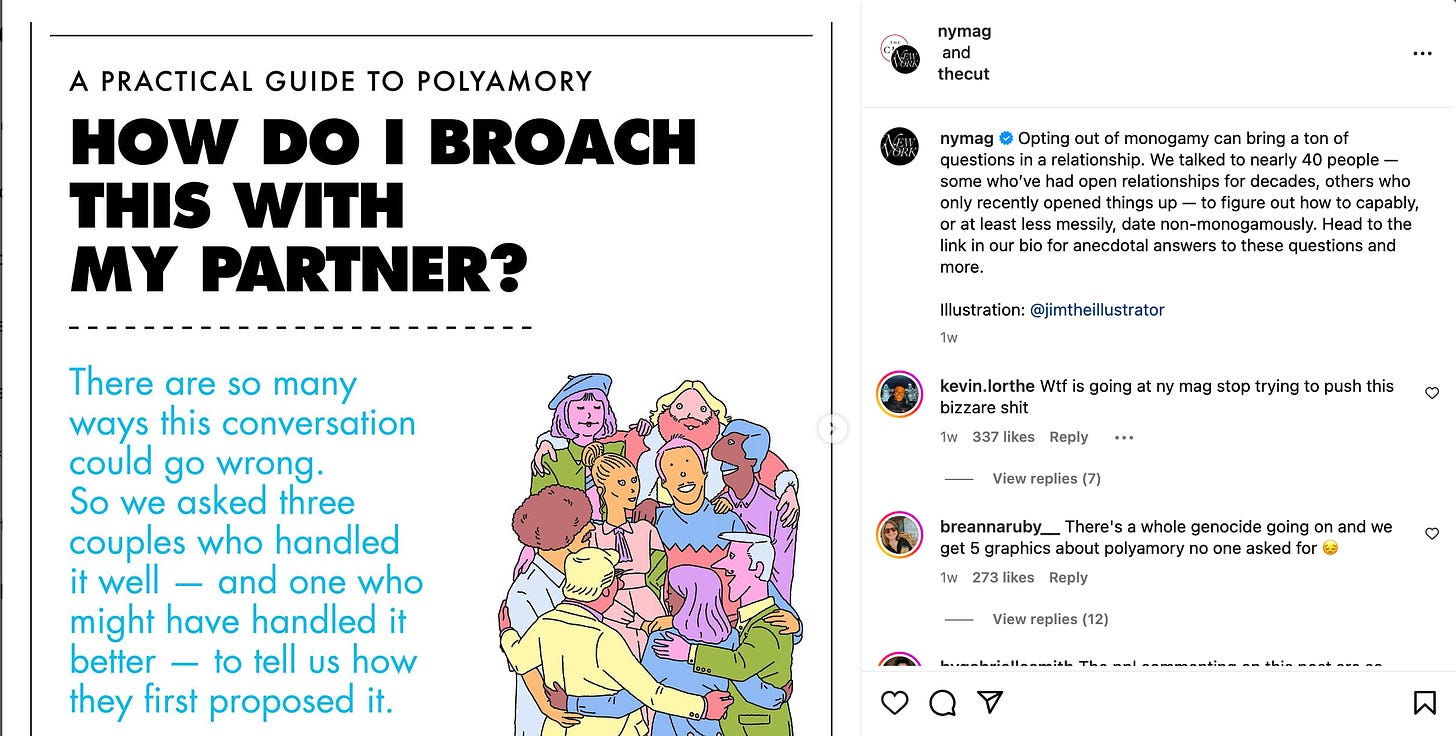I wish you could’ve seen my face as I listened to an episode of the Time to Say Goodbye podcast criticizing the New York Magazine cover story on polyamory, which made waves in my corner of the internet. I’m a longtime listener of this podcast with host Jay Caspian Kang, staff writer at the New York Times and previously a writer for the New Yorker and Vice News, and often appreciate his thoughtful takes on Asian American culture and general left-wing politics. He’s definitely had some controversial and downright bad takes over the years, at least in my book, and the inelegant polemic he spewed in this episode was definitely an argument made in bad faith.
In case you missed it, just two weeks ago New York Magazine published a “Practical Guide to Polyamory,” which covers questions such as How do I broach this with my partner? and Am I being nice enough to my boyfriend’s girlfriend? The guide defines terms, features polyamorous couples, and even discusses those who profess to be non-monogamous unethically and covertly (aka cheating).
Jay takes issue with the articles and the current media hype around polyamory as part of a broader “glut” around navel-gazey, self-focused discourse aimed at a particular set of upper class liberals. He expresses frustration that it’s often sold as radical and political when really he believes it’s just about selfishness and calls it “the final realization of bourgeois individualism.” To be clear, I actually think some of what he’s positing is true, that some liberal elites use the language of social justice to claim every little choice they make is progressive and political. There is a brand of sanctimony Jay is touching on that is very real. However, as someone who has been ostracized for my decision to have multiple ethical romantic partnerships, I have to push back. His wholesale dismissal of polyamory as mere self-indulgence of the educated, coastal elite liberal class ignores the real stigma and lack of legal protections those with alternative relationship structures face just because they forgo pursuing the norm of the nuclear family.
In this episode, Jay and his guest, simply referred to as Tyler (he never explains who Tyler is maybe because he’s been a guest before, but we can assume he works in academia or media and has no experience with polyamory) make several assumptions about polyamory and also make glaring omissions I think warrant a response:
Jay and Tyler both speak from the privileged position of being straight, married men with children, and don’t address how much the system is built for that particular lifestyle, aka the nuclear family. Monogamy and marriage are legally protected and sanctioned, offering multiple protections that polyamorists are denied. From tax benefits to hospital visitation rights, to basic acceptance from family, friends, and coworkers, monogamous people don’t have their two person relationship structure constantly challenged. Both of them show little awareness of these dynamics.
While Jay claims he doesn’t care what consenting adults do, he’s also clearly skeptical that anyone truly willingly enters into polyamorous relationships. “My thing is always like, look, the guy or the girl or whatever, the person, the partner who is not into it and who basically it wasn't their idea. I never believe them when they say they're cool with it.” I mean, I’m certain some people are coerced—I wrote a post about this— but plenty of consenting adults can also healthily want non-monogamy, and Jay (as well as a lot of the comments section of the NY Mag Instagram) does not leave room for this possibility. Polyamory, like sexual orientation, is frequently considered an innate orientation rather than a self-centered decision, where folks engage in multiple romantic relationships as a fundamental aspect of their emotional and relational inclinations, and Jay’s argument misunderstands this. Would it be reasonable for me to call into question Jay’s relationship, or his commitment to being a good parent apropos of nothing in the way that he is doubting the legitimacy of polyamorous relationships?
Most concerning to me is Jay’s contempt toward polyamorous people, calling them “gross” and “self-absorbed” while also claiming he isn’t judging anyone’s choices. He says “I think people took me to be complaining about, like thinking polyamory is degenerate or gross and I’m like deeply uninterested in the sort of morals of it. I don’t care at all” in one breath and then makes moral judgments in another “It just seems to me that, you know, polyamory stuff is that there's like a constellation of ideas that are ostensibly progressive, that are in fact all oriented toward consumption and growth and all of these things that I think are not pro-social.” He and Tyler point out that as many Americans struggle to afford healthcare, childcare and even traditional marriage, it feels out of touch for the elite to reject those institutions in favor of self-actualization. I have sympathy for this perspective, and agree that those embracing polyamory should be cognizant of their privilege. But I don’t get down with the rest of his argument where he equates someone who is polyamorous with those who only prioritize individual fulfillment at the cost of care for society. Simply having more than one romantic partner does not mean someone cannot still fight for healthcare and childcare access for all. I chafe at the dichotomy he presents. I can’t claim that all who practice polyamory are humble, awesome people, but the two are not mutually exclusive. Like sir, your bias is showing.
I always make the mistake of hate-reading the comments section of every post about polyamory on mainstream news accounts on social media, which all follow the same trend. It’s people stating confidently polyamorous relationships “never work out” that the publication is “condoning cheating” or that the post is “normalizing something that is wrong/disturbing/traumatizing/bizarre.” These comments see a flurry of likes for the same emotional, visceral reaction that Jay and Tyler express in this episode. I find it deeply hypocritical the same self-proclaimed progressives who bristle at conservative lawmakers’ efforts to restrict LGBTQ relationships turn around and heap the same scorn at polyamorous people. The same people who are outraged by religious fundamentalists judging same-sex marriages as “unnatural” will confidently deem ethical non-monogamy weird and awful. They support bodily autonomy and pleasure-seeking for themselves but strangely abandon those principles when it comes to polyamory.
Putting my sympathetic hat on, I realize a lot of the knee-jerk reactions and moralizing must stem from a lack of familiarity. But that is why I’m so glad for the increased media coverage and open discourse we’re now seeing around ethical non-monogamy. The more people share their stories, the more we can have greater understanding for relationship formats like this one that meaningfully work for a lot of people. As a proud non-monog strumpet I won’t stand for being shamed as “gross” or unethical by the very people who claim to oppose kink shaming and who support bodily autonomy.
Because of my relationship orientation I cannot receive tax benefits and hospital visitations and my partnerships are not considered “serious” or “committed” legally nor by my peers. Should this topic be political? Since these decisions are made in politics by people we vote for, I would say this is a prime example of how personal relationship choices intersect with politics and governance. At the same time, many poly people and progressives should introspect on how they frame personal decisions as political statements that cross over into sanctimonious performance. I can agree with Jay on that point.
It is complicated though, how we decide what governs interpersonal relationships and I’d love to talk with you about your perspectives! The goal should be a world where no one suffers for whom and how they love, whether mono or polyamorous. I welcome your thoughts on how we can build this world together. Thanks for reading and please share this post with someone you think this would resonate with.
Please take a moment to answer my polls:







The custom of ‘adelphic polyandry’ or sexual access by an unmarried man to his brother's wife is commonplace amongst certain agrarian societies in Malwa region of Punjab amongst Punjabi Jatts, primarily as a means to prevent further fragmentation of land.
The late and controversial singer Amar Singh 'Chamkila' and his wife describe the realities of this practice from the perspective of a woman and her brother-in-law in the song ਭੁਲ ਗਈ ਮੈਂ ਘੁੰਡ ਕਡਨਾ.
An english translation is available here: https://anotherdabblingdilettante.substack.com/p/chamkila-35d